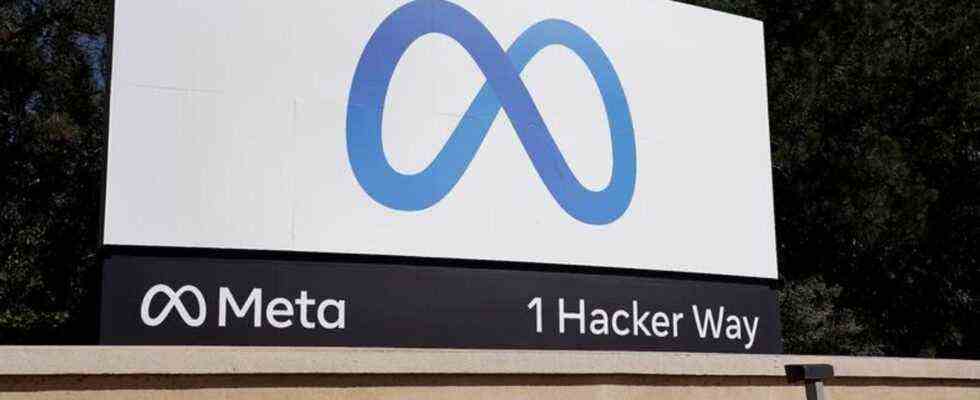Processes
US bankruptcy lawsuit against Facebook admitted to court
The logo of Meta, the new umbrella brand of the Facebook group. Photo: Tony Avelar / AP / dpa
© dpa-infocom GmbH
It could be the biggest competitive process in the tech industry since the US government nearly smashed Microsoft over 20 years ago. Now she wants to force Facebook to sell WhatsApp and Instagram.
Could Facebook be forced in court to sell off its billion-dollar acquisitions WhatsApp and Instagram? The US government has definitely taken the first step towards this goal.
Your initially rejected competition lawsuit was accepted with amendments in front of the court in Washington. At the same time, the judge emphasized that it was still completely open who would ultimately prevail in the proceedings. It should drag on for years.
In the lawsuit, the US trade authority FTC alleges, among other things, that the online network bought the WhatsApp chat service and the photo platform in order to protect its own monopoly in the market. Therefore, the takeovers would have to be reversed. Proofing that could be a pretty big task for the FTC, judge James Boasberg restricted on Tuesday.
The judge had sent back the first version of the lawsuit with humiliating words for the FTC lawyers. Among other things, he criticized that they had not bothered to support the monopoly allegation against Facebook with numbers. “It is as if the agency wanted the court to simply approve of the general belief that Facebook was a monopoly,” he wrote in June.
Monopoly charge
There is no longer a lack of numbers in the amended complaint. The FTC notes that from 2016 to 2020 Facebook had an average market share of 80 percent on smartphones and 98 percent on the PC with daily active users. At no point in time and on any device type did the proportion fall below 70 percent. Convincing enough for Judge Boasberg: “The FTC has done its homework this time,” he praised.
However, this time he dismissed allegations that Facebook had prevented the interaction of its services with those of other developers. The reason: This was not relevant for the period concerned. In its reaction, the Facebook group Meta expressly welcomed the fact that the lawsuit had been narrowed down. “We are convinced that the facts will expose the fundamental weakness of the allegations,” said a spokesman. Facebook’s investments in WhatsApp and Instagram were good for competition and users.
Facebook bought Instagram in 2012 for around a billion dollars and WhatsApp in 2014 for around 22 billion dollars in the end. Instagram now has around a billion users, WhatsApp around two billion. The US competition watchdogs approved the takeover at the time.
Fixed definitions
Regardless of the outcome, the case could establish a fixed definition of the market for social networks in the US justice system – and thus create a clearer framework for antitrust proceedings. So far, Facebook has often countered such allegations that the competition on the Internet is diverse and only a click away.
The FTC (Federal Trade Commission) now describes platforms as personal social networks on which users maintain contacts with friends and family and share contributions and experiences in a common space. Based on this definition, the FTC sees Twitter, Youtube and the emerging video platform Tiktok, for example, in other categories – because they are more geared towards the use of content than personal connections. As a direct competitor of Facebook, among other things, Snapchat is named in the lawsuit. There are also various services that have since been discontinued, such as Google+, MySpace and Friendster.
The original lawsuit was filed in December 2020 at the end of then President Donald Trump’s term of office. It was improved under the leadership of FTC boss Lina Khan, appointed by his successor Joe Biden. Your vote was decisive for introducing the second version of the lawsuit: In the five-member commission, the two remaining members of the Democratic camp voted for and the two Republicans against.
Competition procedure
Facebook wanted to take advantage of this fact and accused Khan of bias. With her earlier statements, she revealed herself to be an opponent of Facebook and, according to Facebook, should therefore not have taken part in the vote. Judge Boasberg did not accept that.
In addition to the FTC, an alliance of more than 40 states had filed a lawsuit against the deals. This was completely rejected by Judge Boasberg in June.
The biggest competition to date in the tech industry in the 1990s was about Microsoft. The group had bundled the Internet Explorer web browser with its Windows operating system. The US Department of Justice argued at the time that in view of the dominant market position of Windows, browser rivals such as Netscape had been pushed out of the still new market by this practice. In the meantime, a judge ordered Microsoft to be broken up, but this was overturned by an appeals court. In the end, the Justice Department and Microsoft agreed on milder conditions.

